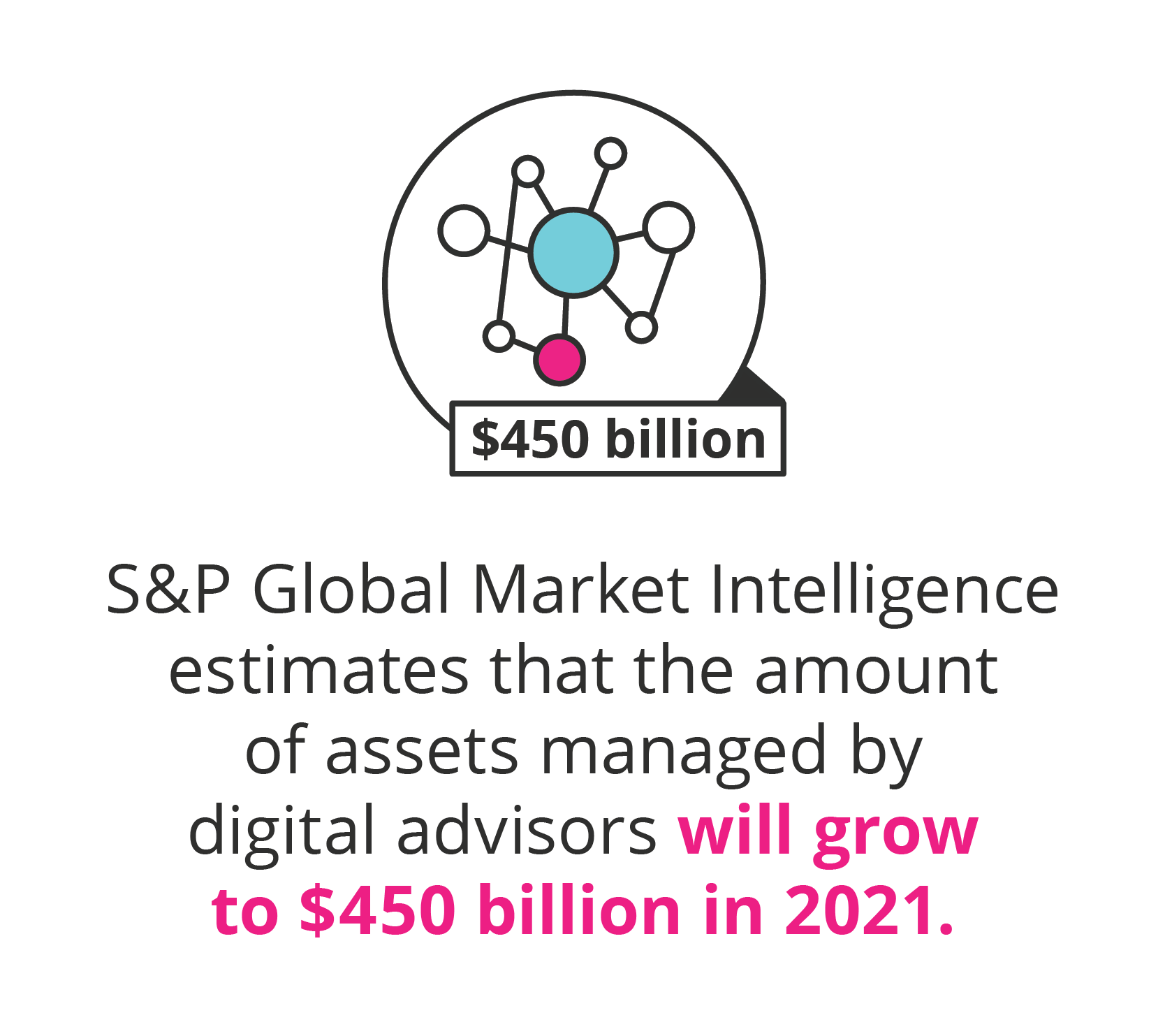Assessing the Profitability of Robo-Advisers
An interview with experts Giovanni Daprà and Nir Vulkan
The wealth management market has felt a substantial shift. In response to the digitalising banking industry, financial guidance is now available from digital wealth managers, otherwise known as robo-advisers. Robo, which stands for robotics, refers to an automated process that doesn’t require the influence of a human being. In this instance, adviser refers to wealth management services. Together, it offers online portfolio management solutions. By utilising mathematical algorithms, robo-advisers invest client assets by automating client advisory and investment decisions.1
S&P Global Market Intelligence estimates that the amount of assets managed by digital advisors will grow to $450 billion in 2021 (up from $100 billion in 2016).2 A core driving factor behind the rise of robo-advisers is the need for accessible, transparent financial management. Although new to the financial market, the impact is already becoming visible. We spoke to industry experts about the current state of the robo-advisery market.

Giovanni Daprà, co-founder and CEO of Moneyfarm, a UK digital wealth management company – and a featured Guest Expert on the Oxford Algorithmic Trading Programme – credits the market rise to simple necessity. “The financial needs of a large number of individuals and families simply weren’t being met – or were being ignored – by the traditional players. Low-cost digital investment advice has come in and disrupted that.”
Professor Nir Vulkan from Saïd Business School, University of Oxford is a leading authority on e-commerce, market design, applied research, and hedge funds. In addition to contributing to and designing a wealth of online and on campus programmes, Vulkan is the Programme Convenor for the Oxford Algorithmic Trading Programme. He pre-empts a holistic change across the financial advisory and investment market. “Except for the very high-network individuals, robo-advisers will become the dominant form [of financial advisors].”
With any emerging technology, there are a number of pertinent questions yet to be answered; most importantly, what is the potential return on robo-investing? In what is already a temperamental, intimate environment, can the traditional face-to-face value of a financial adviser be replaced with a digital interface? With industry insight, we take a look at the future of financial advice.
What are the advantages of robo-advisers?
What robo-advisers do so effortlessly, and what is contributing to their rise, is offer easy investment opportunities, despite your financial background knowledge. As Daprà explains:
The great value of using digital investment advice […] is that it can help more people make better decisions with their money. Too many people pay too much to have their money managed, trade too often, or even too little, and this is costing them over time. [Robo-advisers] take the hassle out of investing for people, removing the burden of choice over what to do with their hard-earned savings, while also delivering greater cost-efficiency.
Beyond the general ease of investment success, other advantages include:
1. Reduction of costs
Vulkan explains that due to the significant cost reduction in financial advice, robo-advisers have made the usually elitist advisery service “available to the general public and not just high-net-worth individuals”. Robo-advisers are also diversifying the market and its monopoly companies. Now, you can access an array of alternative financial solutions that were previously the exclusive business of wealth managers such as UBS or Morgan Stanley.3 The cost advantage is precisely because of the digitalised approach; robo-advisery firms need much less staff to run their business, and the operating expenses are significantly less.4
Now, you can access an array of alternative financial solutions that were previously the exclusive business of wealth managers such as
UBS or Morgan Stanley.
2. Investment transparency
The online nature and ease of use emphasises a unique transparency within investment – one that was formerly missing. Daprà explains how costs are broken down and simplified within digital wealth management. The digital platform enables investors to access their portfolio easily and immediately; it “enables people to check the performance of their investments at the touch of a button, which is miles away from the opaque investing experience people may have had before.”
3. Removes human bias
Your emotions may influence your decisions on a daily basis. Managing their influential power is crucial in high-stake scenarios, especially in financial decisions. The digital structure of robo-advisers removes the emotional component of investing. A 2017 study by Harvard University Fellow Jennifer Logg discovered that, when it comes to subjective decisions, people prefer advice from humans. Contrary to this, when it comes to objective decisions, like forecasting and predicting, people would rather rely on algorithms.5 Vulkan agrees: “Robo-advisers tend to be more accurate as they function through technology and algorithms that take into account risk parameters, and remove the element of human biases.”
4. Personalised investment
As the digital wealth management landscape develops, so will the technology. Daprà believes that this is only the beginning when it comes to artificial intelligence’s true potential in financial advice. With time, companies will be able to gather data points that run on a suitability algorithm, which builds a more holistic picture of an individual’s financial life. Data will allow robo-advisers to offer personalised advice that helps investors grow their investment returns. “This granular data,” Daprà explains, “can provide a hyper-detailed picture of personal financial life, removing in-built biases or misconceptions a person may have when they respond to a questionnaire or in-person interview with a financial adviser.”
What are the barriers to adoption?
Despite the digital revolution being well underway, there is still a hesitancy around the adoption of disruptive technology. In a field that has a long legacy of face-to-face advisery services, choosing to trust a robot with your most precious asset takes a significant change in investment behaviour. The challenges within the robo-advisery industry include:
1. Trust
This is the greatest challenge, says Daprà who believes that it’s important to bridge the gap between digital advice and the human element. “Our investment consultants are available over the phone and via the app to explain the advice people have been given [by robo-advisers] or to talk through any concerns they may have about market movements. Additionally, all asset allocation decisions are made by an Investment Committee – a team of human investment experts – to help maximize returns and manage risk.” Additionally, robo-advisers should offer fully FCA-regulated (Financial Conduct Authority) investment advice, so that despite it being digital, it achieves the same level of protection as human advice.
2. Algorithmic aversion
As an area of behavioural research, algorithmic aversion refers to when people prioritise human advice over algorithmic-generated advice, despite the awareness that algorithmic-driven recommendations outperform humans.6 This reluctance is a highly researched area that Vulkan and his colleagues within finance and computer science are avidly investigating. He says:
Our initial findings are that when it comes to losses, people regret more when the advice comes from a robot. When it comes to money, most people do like to have a human at the end of the telephone line. This doesn’t mean that robots can’t make the important decisions, as long as there is someone to explain and reassure consumers at the end of the day that they ultimately have control over their money and overall decisions.
3. Industry regulations
Vulkan explains how industry regulators, such as the FCA, who may not be as tech-savvy, will need to be guided through the landscape of digital wealth management. Businesses will need to make sure that regulators like the FCA, “are confident that the general regulatory framework for investment is kept by robo-advisers.”
Algorithmic practises and robo-advisers will have to demonstrate over time that they can offer quality investment advice, at lower costs, while still delivering on returns. These aversions will not easily fall away, but the gradual evolution of financial-advisery methods provides an opportunity for human-robot collaboration.
I believe robo-advisers will lower the barriers to investments making it more common in the population overall.
Nir Vulkan
Who is robo-investing for?
Throughout the ongoing digital transformation, it’s important to remember that disruption does not mean replacement. Rather, it establishes new potential for partnership and growth, believes Daprà. “Digital advice and human advisers can – and will – coexist in the future.” This partnership is facilitated by the fact that human and digital financial advisers serve different customer bases.
As a fully automated, easy-to-use, secure technology, the very nature of robo-advisers makes investing for a younger generation with limited financial knowledge accessible and realistic. Daprà notes that, although this may be true, digital investment advice does not hold its appeal to solely millennials: “We feel that older generations, who may be slightly higher earners, will follow the same decision framework when comparing different investment providers. They will look at how they can get financial advice, in the most cost-efficient way, while still maximising returns.” Vulkan recounts from his experience in the industry that he sees many startups hoping to ignite a younger culture of financial investing. The challenge within this marketing strategy comes down to the simple demographic facts: younger people have less money to invest. But, adds Vulkan, robo-advisers will make a general market impact, not just a generational impact. “I believe robo-advisers will lower the barriers to investments making it more common in the population overall.”
Are robo-advisers suited for all investment strategies?
“Not in terms of the mathematics, or the algorithm complexity and design,” Vulkan explains, “But regulation around certain asset classes is more tight than in others. We’ll find that, at least initially, robo-advisers will be more dominant in the areas with less stringent regulation.” He explains that a digital wealth manager is perfect for those who:
- Are seeking simple financial solutions
- Want to grow their wealth over time
- Are looking for a cost-efficient platform
In contrast, those with more complex financial situations that require tax planning, may require human advice.
It’s when individual assets and investment strategies are analysed, that robo-human coexistence occurs less. Daprà explains that digital wealth managers have different investment strategies available, depending on an investor’s appetite for risk: preference to equity exposure, time horizons, and whether its more aligned to a fixed income exposure or a more risk-averse.
What is the future of financial advice?
The rapid robo-adviser industry growth points to the large advice-gap within financial services. According to a LendEDU poll of 1,000 robo-adviser users, almost 62% of respondents felt that their robo-adviser provided higher returns than their previous method of investing on the stock market. In the event of a sudden market downfall, 60% of investors would still stick to the plan their robo-advisers have mapped out for them. Close to 54% of users found that their robo-adviser produced better returns than they were initially expecting. And finally, almost 75% believe robo-advisers are the future of investing.7
Robo-advisers mitigate the issue of limited financial knowledge. Investment is simplified and advice is consistent. Based on mathematical algorithms, this trialed and tested technology is beyond bias and comes at a minimal cost, making it one of the most attractive investment options on the market. Its sustainable future depends on society’s gradual understanding and trust of the technology. In terms of investment strategies, a 100% algorithm-driven approach is suited for some – but not for all. Will they replace your traditional human adviser? No. But the space for collaborative intelligence is certainly growing.
- 1 (Aug, 2016). ‘The Expansion of Robo-Advisory in Wealth Management’. Retrieved from Deloitte.
- 2 Mason, T. (Aug, 2017) ‘U.S. digital adviser forecast: AUM to surpass $450b by 2021’. Retrieved from S&P Global.
- 3 (Dec, 2016). ‘Cost-Income Ratios and Robo-Advisory’. Retrieved from Deloitte.
- 4 (Dec, 2016). ‘Cost-Income Ratios and Robo-Advisory’. Retrieved from Deloitte.
- 5 Logg, J. (2017). ‘Theory of Machine: When Do People Rely on Algorithms?’ Retrieved from Harvard.
- 6 Sin, R. (Jul, 2018). ‘Robo-advisors vs financial advisors: will online one remain?’. Retrieved from Morning Star.
- 7 Hamory, J. (Jan, 2018). ‘Robo-advisors encouraging millenials to invest, but do they understand how it works?’ Retrieved from LendEDU.
